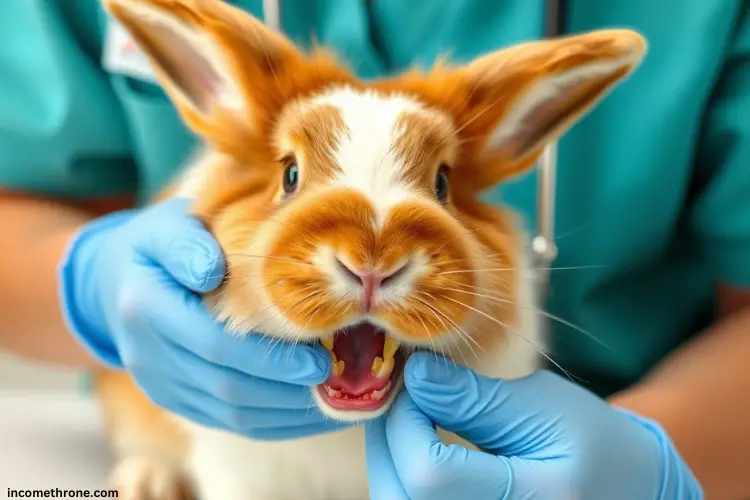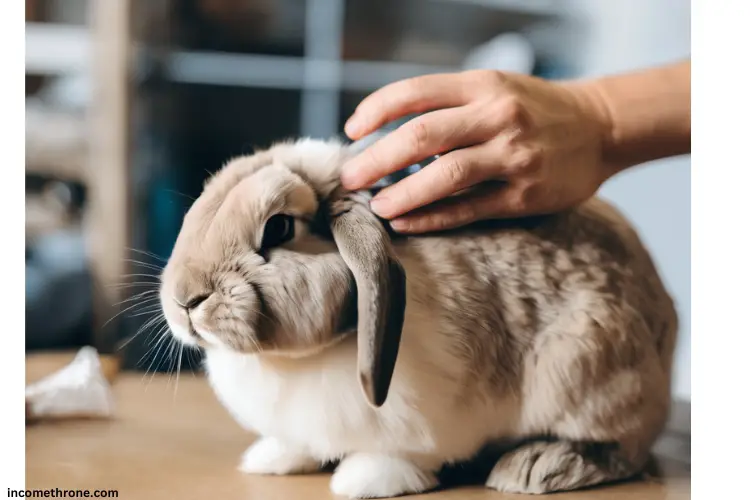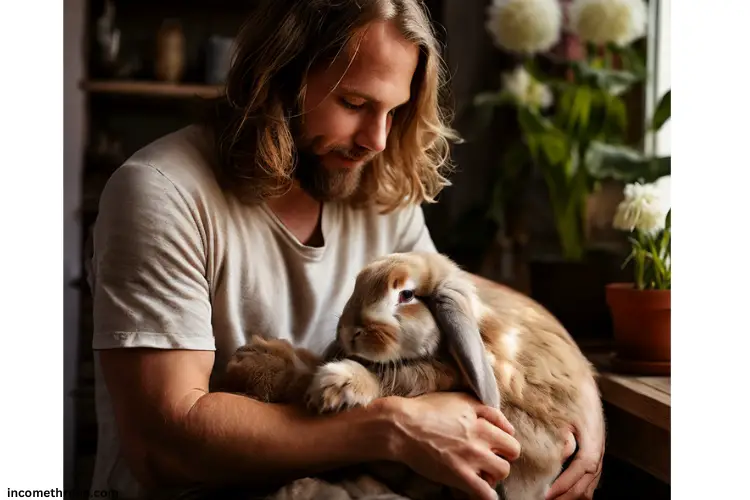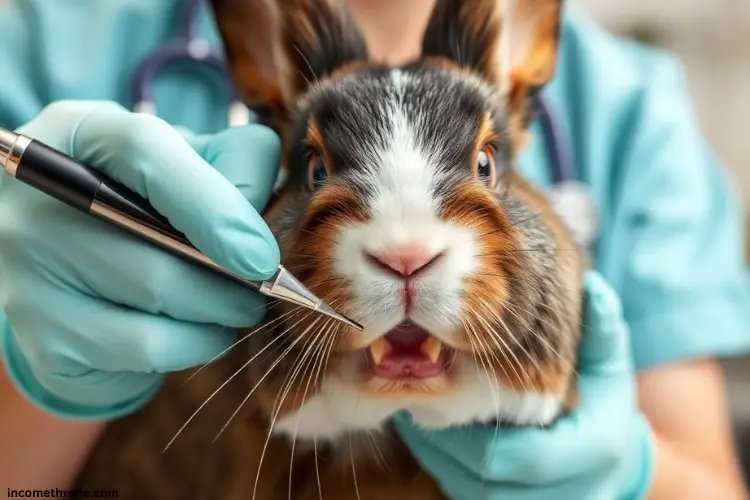Holland Lop rabbits are beloved pets known for their adorable floppy ears and compact size. However, like many rabbit breeds, they can be prone to dental problems.
Understanding how to properly care for your Holland Lop’s teeth and manage dental issues is crucial for maintaining their overall health and well-being.
In this comprehensive guide, we’ll explore the causes, symptoms, and treatments for dental problems in Holland Lop rabbits, as well as preventive measures to keep your furry friend’s teeth in top condition.
Understanding Holland Lop Rabbit Dental Anatomy
Before diving into dental issues, it’s essential to understand the unique dental anatomy of rabbits, including Holland Lops:
- Rabbits have 28 teeth in total
- 16 teeth in the upper jaw:
- 4 incisors (2 visible front teeth and 2 smaller “peg teeth” behind them)
- 6 premolars
- 6 molars
- 12 teeth in the lower jaw:
- 2 incisors
- 4 premolars
- 6 molars
Unlike human teeth, rabbit teeth grow continuously throughout their lives. This evolutionary adaptation allows them to wear down their teeth naturally through their diet of fibrous plant material.

Common Dental Issues in Holland Lop Rabbits
Holland Lop rabbits, particularly due to their brachycephalic (flat-faced) features, can be more susceptible to certain dental problems. Some common issues include:
- Overgrown teeth
- Malocclusion (misaligned teeth)
- Tooth root abscesses
- Broken or chipped teeth
- Periodontal disease
Recognizing Signs of Dental Problems
Early detection of dental issues is crucial for effective treatment. Here are some signs to watch for in your Holland Lop rabbit:
- Weight loss or decreased appetite
- Difficulty eating or dropping food while chewing
- Drooling or wet chin
- Grinding teeth (beyond normal behavior)
- Swelling around the jaw or face
- Nasal discharge
- Watery eyes
- Unkempt appearance (due to difficulty grooming)
- Changes in fecal pellet size or consistency
It’s important to note that rabbits, being prey animals, often hide signs of illness. Regular check-ups and close observation are essential for catching dental problems early.

Preventive Measures for Dental Health
Preventing dental issues is always preferable to treating them. Here are some key strategies to maintain your Holland Lop’s dental health:
1. Provide a Proper Diet
A high-fiber diet is crucial for maintaining healthy teeth in rabbits. Ensure your Holland Lop has:
- Unlimited access to fresh, high-quality grass hay (e.g., Timothy hay)
- Limited amounts of pellets (about 1/8 to 1/4 cup daily for adult Holland Lops)
- Fresh vegetables in moderation
- Occasional treats (in very small amounts)
2. Offer Chew Toys
Provide safe chewing materials to help wear down teeth naturally:
- Untreated wood blocks
- Willow balls or baskets
- Cardboard tubes (without glue or staples)
- Apple or willow branches (pesticide-free)
3. Regular Home Checks
Perform gentle home checks of your rabbit’s front teeth weekly:
- Gently lift the lips to examine the incisors
- Look for even alignment and proper length
- Check for any signs of injury or overgrowth
4. Veterinary Check-ups
Schedule regular check-ups with a rabbit-savvy veterinarian:
- Aim for at least annual examinations
- More frequent visits may be necessary for rabbits with known dental issues
- Professional dental exams can detect problems with molars that aren’t visible during home checks

Treating Dental Issues in Holland Lop Rabbits
If your Holland Lop develops dental problems, prompt veterinary care is essential. Treatment options may include:
1. Tooth Trimming
For overgrown teeth, your veterinarian may recommend trimming:
- Incisors can often be trimmed while the rabbit is awake
- Molar trimming typically requires anesthesia
- A specialized dental bur is used to carefully grind down overgrown teeth
2. Dietary Adjustments
Your vet may suggest dietary changes to promote better tooth wear:
- Increasing hay intake
- Reducing pellets
- Adding specific vegetables that encourage more chewing
3. Pain Management
For rabbits experiencing pain due to dental issues:
- Prescribed pain medications may be necessary
- Anti-inflammatory drugs can help reduce swelling
4. Antibiotics
In cases of infection or abscesses:
- Oral or injectable antibiotics may be prescribed
- Long-term treatment might be required for persistent infections
5. Surgery
For severe cases or persistent problems:
- Tooth extraction may be necessary
- Advanced procedures to correct jaw alignment might be considered

Handling Your Holland Lop During Dental Care
Proper handling is crucial when caring for a Holland Lop with dental issues. Here are some tips:
- Use a towel wrap technique to gently restrain your rabbit
- Approach slowly and speak softly to minimize stress
- Never force your rabbit’s mouth open
- If administering medication, follow your vet’s instructions carefully
- Provide a calm, quiet environment for recovery after dental procedures
Comparison of Dental Health Factors in Holland Lop Rabbits
| Factor | Healthy Rabbit | Rabbit with Dental Issues |
|---|---|---|
| Appetite | Normal, eager to eat | Reduced, may avoid food |
| Drooling | Minimal to none | Excessive, wet chin |
| Tooth Appearance | Even, proper length | Overgrown, misaligned |
| Behavior | Active, curious | Lethargic, irritable |
| Grooming | Regular self-grooming | Unkempt appearance |
| Fecal Output | Normal-sized pellets | Small or misshapen pellets |
Long-Term Management of Dental Health
Managing dental health in Holland Lop rabbits is an ongoing process. Here are some long-term strategies:
- Maintain a Consistent Diet: Stick to a high-fiber diet rich in hay to promote natural tooth wear.
- Regular Monitoring: Continue weekly home checks and schedule regular veterinary exams.
- Environmental Enrichment: Provide plenty of opportunities for natural chewing behaviors.
- Weight Management: Keep your Holland Lop at a healthy weight to prevent additional stress on their teeth and jaw.
- Stress Reduction: Minimize stress in your rabbit’s environment, as stress can exacerbate dental issues.
- Educate Yourself: Stay informed about rabbit dental health and any new developments in care techniques.
When to Seek Emergency Care
While regular check-ups are important, certain situations require immediate veterinary attention. Seek emergency care if your Holland Lop:
- Stops eating or drinking for more than 12 hours
- Shows signs of severe pain (hunched posture, grinding teeth excessively)
- Develops sudden swelling around the face or jaw
- Has difficulty breathing
- Experiences uncontrolled bleeding from the mouth
Conclusion
Dental health is a critical aspect of caring for Holland Lop rabbits. By understanding the unique dental needs of these adorable bunnies, providing proper nutrition, and staying vigilant for signs of dental issues, you can help ensure your Holland Lop lives a happy, healthy life.
Remember, prevention is key, but prompt veterinary care is essential if problems do arise. With proper care and attention, you can keep your Holland Lop’s teeth in top condition, allowing them to thrive and bring joy to your home for years to come.
By following these guidelines and working closely with your veterinarian, you can effectively handle dental issues in your Holland Lop rabbit and maintain their overall health and well-being. Regular care, attention to diet, and prompt treatment of any problems will help ensure your furry friend enjoys a comfortable and pain-free life.

